A ‘long overdue’ debut for Sarah Kane

Simply sign up to the Life & Arts myFT Digest -- delivered directly to your inbox.
The playwright Alistair McDowall vividly remembers his first encounter with Sarah Kane’s work. At 16, he read Blasted, the play that propelled Kane to instant fame when it opened at London’s Royal Court in 1995 and its full-on violence made headlines.
“At first it felt kind of naughty,” McDowall, now 28, recalls, “because it’s so extreme. Then I started to realise what she was doing. When the bomb [in Blasted] goes off it doesn’t just blow up the room: it blows up the language, it blows up the characters, it blows up the themes, it blows up everything. And that was a real lightbulb moment.”
Kane, he adds, had a profound effect on his generation of playwrights: “It’s her fearlessness. She opened so many doors in my head — it was kind of intoxicating. I can’t think of a writer I know who hasn’t referenced her at some stage. She did such a vast amount in a small number of plays.”
Yet despite her impact, and her standing outside her own country (her work is particularly highly regarded in Germany), none of Kane’s plays has ever been staged at the National Theatre. Until now. This month, 17 years since her tragic early death from suicide in 1999, the National mounts its first production of a Kane play. Later this year, a new opera of 4.48 Psychosis will be the first musical adaptation of one of her plays, and Phaedra(s) from Théâtre de L’Odéon, Paris, starring Isabelle Huppert and drawing on Phaedra’s Love, will have its British premiere.
It feels like confirmation that Kane’s work can be seen as that of a radical and profoundly influential playwright, rather than an enfant terrible with a taste for graphic brutality. For Rufus Norris, artistic director of the National Theatre, her debut there is “long overdue”.
“Her work challenged a lot of what I thought theatre was about,” he says. “It has stood the test of time . . . She was a long way ahead of most of us.”
Kane wrote just five plays: Blasted (1995), Phaedra’s Love (1996), Cleansed (1998), Crave (1998) and 4.48 Psychosis (1999). The National is staging Cleansed, and it’s certainly a tough prospect: it is set, enigmatically, on a university campus turned clinic, run by a sadistic torturer. And it is certainly violent: Kate Mitchell, directing the National production, is figuring out how “to take out a tongue with a pair of scissors”. But, she adds, “It’s also about love. It is full of beautiful, tender love scenes.”
The search for love haunts Kane’s work. Cleansed tests love to extremes, probing at what it can endure. As with Blasted, the play is informed by the atrocities of war and the profound moral challenge they pose.
“I love [Kane’s] intellect,” says Mitchell, “which is steely, and her formal bravery and her theatricality. Everything is tough, definite, non-negotiable. She [insists] on interrogating how we make theatre, why we make theatre and pushing us all to the limits of our possibilities as theatre-makers. And that is splendid.”

Kane was adamant that her work should not be filmed: she wrote for the stage and each work pushed further at what could or should be done on stage. Yet her innovation was rooted in tradition. Much as she admired experimental writers such Howard Barker, Edward Bond and Caryl Churchill, her plays draw on Shakespeare and the ancient Greek and Roman tragedians.
Dan Rebellato, professor of contemporary drama at Royal Holloway College, University of London, observes that her work gradually becomes more and more distilled.
“The thing she liked more than anything else was getting rid of anything that was extraneous,” he says. “Blasted does this brilliant thing of starting out more or less like a conventional, naturalistic two-hander. The blast that destroys the hotel also destroys the form of the play. With Cleansed, she does away with naturalism completely. With Crave, she does away with almost everything visual. And in 4.48 Psychosis there are no characters at all. It’s a constant stripping away to see what can a playwright do without.”
4.48 Psychosis traces an individual’s descent into suicidal depression and Kane killed herself shortly after finishing it. This bleak fact makes it a very painful read. Yet this remarkable play, constantly shape-shifting, combines lucidity, dark humour and lyrical beauty. Kane explained in an interview that, during a psychotic breakdown, “You no longer know where you stop and the world begins”, and that the play was exploring this by striving towards “making the form and content one”. Composer Philip Venables, whose opera 4.48 Psychosis will be presented by the Royal Opera House in association with the Lyric Hammersmith, sees in it a challenge for contemporary opera.
“Opera doesn’t have to be narrative-driven drama,” he explains. “The form of 4.48 Psychosis is amazing for music because it is so flexible and because it doesn’t assign character: some of it is like music on the page. We have a cast of six and 12 instrumentalists and we’re trying to render the polyphony of inner voices clearly indicated on the page in a real polyphony of voices.”
Sarah Kane’s originality, formal daring and uncompromising material appealed to innovative directors across the globe. The Polish director Krzysztof Warlikowski, who is staging Phaedra(s), recalls, “she spoke on our behalf about the things we were not able to speak out about.” But she also liked a good joke — both in person and in her plays. “I think that is one of the things people forget about Sarah,” says the actor and director Daniel Evans, who appeared in the premieres of both Cleansed and 4.48 Psychosis. “She had this incredibly wicked sense of humour.”
“She was incredibly funny and loyal,” agrees Vicky Featherstone, who worked with Kane at Paines Plough theatre company. “She ran amazing workshops. She was so ambitious for the writers we worked with. Somebody would write something and she would look them in the eye and say, ‘You know that’s not good enough’.”
In one sense, that impulse is her enduring legacy. Kane’s work lays down a challenge to writers to keep examining what a play can do, to express the meaning in dramatic form as well as content. For McDowall, her example keeps him on his toes: “Whenever I’m writing something, I ask myself, ‘Why is this a play?’ And if it could be anything else then it is best not to write it. She was fundamental to me in realising that.”
‘Cleansed’, February 16-May 5, National Theatre, London, nationaltheatre.org.uk; ‘4.48 Psychosis’, May 24-28, Lyric Hammersmith, London, lyric.co.uk, roh.org.uk; ‘Phaedra(s)’, June 9-18, Barbican, London barbican.org.uk
Photographs: Ullstein Bild via Getty Images; Stephen Cummiskey
Comments